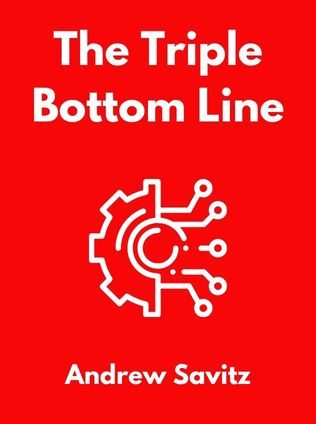
The Triple Bottom Line
Why Sustainability is Transforming the Best-Run Companies and How It Can Work for You
By Andrew Savitz
Published 08/2006
About the Author
Andrew W. Savitz is a prominent figure in the field of sustainability and corporate responsibility. As the president of Sustainable Business Strategies and a partner in Environmental and Sustainable Business Services at PricewaterhouseCoopers LLP, Savitz has spent over 15 years delving into the intricacies of Triple Bottom Line (TBL) reporting and sustainability. His expertise is well-reflected in his book, "The Triple Bottom Line: How Today's Best-Run Companies are Achieving Economic, Social and Environmental Success – and How You Can Too," where he collaborates with Karl Weber to offer a comprehensive guide on integrating sustainability into business strategies.
Main Idea
The core premise of "The Triple Bottom Line" revolves around the concept of sustainability, which originated in the 1980s. It underscores the necessity for corporations to create profits for their shareholders while simultaneously protecting the environment and enhancing the lives of all stakeholders. This book argues that sustainability is not just an ethical obligation but a critical business strategy that aligns with modern economic realities and stakeholder expectations. It emphasizes that companies must operate at the intersection of business interests and societal benefits to achieve long-term success.
Table of Contents
- Selling Hershey
- The Sustainability Sweet Spot
- The Age of Accountability
- Business Responds
- Embracing Accountability
- Where Do You Stand Today?
- Shaping Your Strategy
- Launching Your Program
- Managing Stakeholder Engagement
- Special Stakeholder Challenges
- The Future of Sustainability
Selling Hershey
On July 25, 2002, the idyllic town of Hershey, Pennsylvania, faced a significant upheaval when the Wall Street Journal reported that Hershey Trust, the charitable organization holding a controlling stake in Hershey Foods Corporation, planned to sell to the highest bidder. This decision sparked a massive outcry from the community, former CEOs, union leaders, and alumni of the Milton Hershey School. The incident highlighted a critical lesson in sustainability: focusing solely on profit can backfire. Companies must consider the social, economic, and environmental impacts on all stakeholders, not just shareholders.
The Hershey incident teaches several vital lessons:
- Profit alone is an inadequate measure of success.
- Businesses are accountable to a broader array of stakeholders than they might realize.
- Good companies can suffer if they fail to adopt a broad view of accountability.
- Engaging with stakeholders is crucial for successful management.
"Well-intentioned, well-managed organizations like Hershey that focus exclusively on shareholders as if they were the only stakeholders that matter are headed for trouble." - Andrew W. Savitz
The Sustainability Sweet Spot
Many business leaders misunderstand sustainability as a mere distraction or a chore. However, Savitz clarifies that sustainability is not about philanthropy. It's about conducting business in a way that benefits all stakeholders naturally. The sustainability sweet spot is where business interests overlap with public interests. For instance, PepsiCo found its sweet spot by promoting healthier lifestyle products, like Tropicana and Quaker Oats, which have become the fastest-growing segment of its North American portfolio.
Sign up for FREE and get access to 1,400+ books summaries.
You May Also Like
Rich Dad Poor Dad
What the Rich Teach Their Kids About Money - That the Poor and Middle Class Do Not!
By Robert T. KiyosakiFreakonomics
A Rogue Economist Explores the Hidden Side of Everything
By Steven D. Levitt and Stephen J. DubnerThe Lean Startup
How Today's Entrepreneurs Use Continuous Innovation to Create Radically Successful Businesses
By Eric RiesWho Moved My Cheese?
An Amazing Way to Deal with Change in Your Work and in Your Life
By Spencer Johnson, M.D.Factfulness
Ten Reasons We're Wrong About the World – and Why Things Are Better Than You Think
By Hans RoslingMake Your Bed
Little Things That Can Change Your Life...And Maybe the World
By William H. McRaven



















